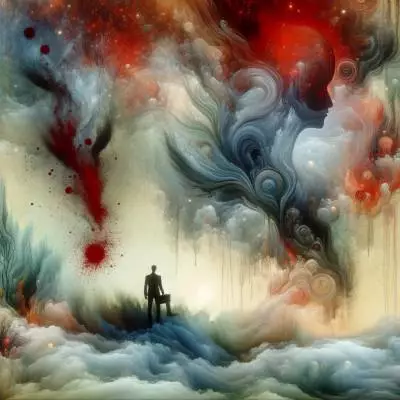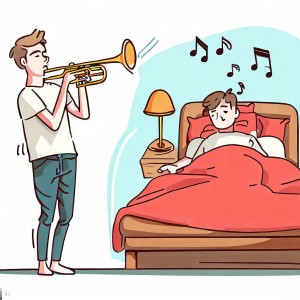Seeing Someone Staring at You in a Dream: A Window into the Subconscious

Dreams can often be perplexing, especially when they involve someone intently gazing at you. This phenomenon, ubiquitous across cultures, can provide intriguing insights into our subconscious and emotional state, encouraging us to delve deeper into the mysteries of the mind and the symbolism of our nocturnal narratives.
I. Introduction
A. The Mysterious Landscapes of Dream Analysis
Dreams, those mysterious narratives that unfold in the theater of our minds during sleep, have intrigued philosophers, scientists, and psychologists for centuries. These nocturnal fantasies, blending reality and imagination, often defy logic, yet they are believed to hold profound insights about our desires, fears, and unresolved issues. Dream analysis, a cornerstone of psychoanalytic theory, posits that dreams are more than mere random brain activity during sleep; they are windows into our subconscious, revealing aspects of ourselves that may remain hidden or suppressed in waking life. Whether we are fleeing from danger, soaring above the clouds, or simply going about our daily routines, our dream scenarios are symbolic narratives ripe for interpretation. The key to unlocking their meaning is understanding the symbols, themes, and emotions permeating our dreamscape.
B. A Closer Look: The Watchful Eyes in Dreams
Among the panoply of dream scenarios, one phenomenon that often unsettles dreamers is the sensation of being watched or stared at by someone in a dream. This experience, both eerie and intriguing, raises many questions. Who is this person scrutinizing us? Why do they command such attention in our dream? What does being the subject of someone’s gaze in this surreal realm mean? Is this an echo of our waking fears and insecurities, or does it symbolize something deeper, something that we have yet to acknowledge about ourselves? As we delve into this phenomenon of being observed in dreams, we will explore the various perspectives and interpretations that might help shed light on this enigmatic dream symbol. Doing so opens the door to a deeper understanding of our subconscious and potentially unlocks transformative insights about our emotional and psychological state.
II. Understanding the Dream Context
A. The Narrative Threads: Contextual Elements in Dreams
In the labyrinthine realm of dreams, context is a vital compass guiding us toward understanding. The setting, characters, objects, and actions – each of these elements contribute to the overall narrative of the dream and carry its symbolic weight. For instance, being watched by a stranger in a crowded cityscape might suggest different meanings than being observed by a loved one in the tranquility of your childhood home. Furthermore, the emotions experienced during the dream – fear, curiosity, or even indifference – play a significant role in interpretation. Thus, in deciphering the meaning of being watched in a dream, it’s crucial to consider the entire dream tableau, as every detail potentially holds a piece of the puzzle.
B. The Unseen Observer: Identifying the Watchful Eye in Dreams
The observer’s identity in dreams is crucial to the dream’s symbolism. If the watcher is a known figure, it could suggest that the dreamer’s relationship with this person, or what they represent, needs attention. In contrast, an unknown observer may symbolize aspects of the self that are unfamiliar or neglected. The observer might also embody societal judgment or pressure, particularly if the dream triggers feelings of scrutiny or exposure. Consequently, recognizing the observer and their role in the dream narrative can illuminate the underlying themes and point towards a more comprehensive understanding of the dream’s message.
III. The Psychological Interpretation
A. The Subconscious Theatre: Jungian and Freudian Perspectives on Being Observed in Dreams
According to Freudian theory, dreams reflect repressed desires and unresolved conflicts. Thus, being watched in a dream may symbolize internal anxieties about judgment or acceptance, possibly linked to issues from the dreamer’s waking life. In contrast, Carl Jung proposed that dreams are a medium for our psyche to communicate with us, often through universal symbols or archetypes. From a Jungian perspective, the observer in the dream could represent the ‘Shadow’ – the unconscious aspects of the self that we are unaware of or choose to ignore. Thus, this dream scenario might invite us to acknowledge and integrate these hidden facets of our personality.
B. The Symbolic Gaze: Unraveling the Meaning of the Watchful Eye in Dreams
The symbolism of being watched in a dream can vary widely, drawing from personal experiences, cultural influences, and psychological interpretations. Generally, such dreams might hint at vulnerability, anxiety about judgment, or a need for recognition. They may also indicate self-awareness or self-reflection, suggesting that the dreamer closely observes their actions, thoughts, or feelings. Alternatively, the observer could symbolize guidance, protection, or wisdom, particularly if they evoke comfort or reverence. Thus, understanding the symbolic significance of the watchful eye can catalyze personal growth, fostering a deeper connection with our subconscious and enriching our self-understanding.
IV. Cultural Perspectives on Dream Observation
A. The World’s Dream Tapestry: Global Interpretations of Being Watched in Dreams
Dreams and their interpretations are not confined to personal psychology; they also draw deeply from the well of cultural context. Around the world, different cultures have unique perspectives on the symbolism of being watched in dreams. For instance, in some Native American cultures, such a dream might be seen as a spiritual visitation or guidance from ancestral spirits. In contrast, traditional Chinese dream interpretation might view the observer as reflecting the dreamer’s ‘Yin’ energy – the passive, receptive aspect of the self. Some African cultures might interpret the experience as communication from the spirit world, while in many Western societies, it could be seen as an expression of anxiety or self-consciousness. These varied interpretations underscore the complex tapestry of dream symbolism, influenced by cultural beliefs, traditions, and societal norms.
B. A Patchwork of Perspectives: Comparing and Contrasting Cultural Interpretations
While there are common threads in dream interpretation across cultures, such as acknowledging dreams as a significant psychological and spiritual phenomenon, stark contrasts also exist. Some cultures view being watched in dreams as a positive sign, offering protection or wisdom, while others may interpret it as a forewarning or indication of internal strife. Moreover, the identity of the observer also takes on different connotations depending on cultural context – ancestors, deities, spirits, or symbolic representations of the self. These divergent perspectives enrich our understanding of dream symbolism, reminding us that our dreams are a nexus of personal, psychological, and cultural influences.
V. Personal Interpretation: Decoding the Dream’s Message
A. The Personal Tapestry: The Role of Individual Experiences and Emotions in Dream Analysis
While psychoanalytic theories and cultural perspectives provide valuable frameworks for interpreting dreams, the final piece of the puzzle lies within the dreamer. Personal experiences, emotions, and circumstances play a significant role in shaping our dreams. The observer in the dream could be someone significant from the dreamer’s waking life, embodying a relationship or issue that needs attention. The emotions experienced during the dream – fear, comfort, or curiosity – can also provide clues to the dream’s meaning. Thus, understanding the dream’s message requires an honest introspection into one’s feelings, experiences, and current life situation.
B. The Inner Detective: Techniques for Introspection and Personal Dream Symbolism
Deciphering personal dream symbolism can be an enriching journey of self-discovery. Techniques such as keeping a dream journal, engaging in reflective meditation, or seeking professional dream analysis can be instrumental in this process. Writing down dreams upon waking helps capture details and emotions that may fade as the day progresses. Reflective meditation allows a calm and focused exploration of the dream’s content, facilitating connections with personal experiences or emotions. Professional dream analysis can provide additional insights, particularly when the dream’s symbolism feels elusive. Through these techniques, the dreamer can better understand their dream’s message, fostering personal growth and self-understanding.
FAQs
Q: What does it mean if I see someone staring at me in a dream?
A: The meaning of someone staring at you in a dream can vary widely depending on the dream’s context, your personal experiences, and even cultural beliefs. It could symbolize feeling judged or watched or represent self-awareness, guidance, or unresolved personal issues.
Q: Who is the person watching me in my dream?
A: The identity of the observer in your dream can be significant. If the watcher is someone you know, it might suggest that your relationship with this person or what they represent needs attention. An unknown observer could symbolize aspects of yourself you’re unaware of or acknowledge.
Q: Why do I feel scared when someone watches me in my dream?
A: Feelings of fear or discomfort when being watched in a dream might reflect anxieties or insecurities in your waking life. It could also indicate vulnerability or a fear of being judged or exposed.
Q: Could the observer in my dream be a symbol of protection?
A: Yes, depending on the context and your feelings during the dream, the observer could indeed symbolize protection, guidance, or wisdom. This interpretation is common in certain cultural contexts, such as some Native American cultures.
Q: How can I interpret my dreams?
A: Personal dream interpretation involves introspection and self-awareness. Techniques like maintaining a dream journal, reflective meditation, and professional dream analysis can help you decode the symbolism in your dreams and connect it with your personal experiences and emotions.
Q: Can cultural beliefs influence how I interpret being watched in my dream?
A: Yes, cultural beliefs and traditions can significantly influence dream interpretations. Different cultures have unique perspectives on the symbolism of being watched in dreams, ranging from spiritual visitations to reflections of internal strife or anxiety.
Q: Are dreams of being watched a cause for concern?
A: Not necessarily. While such dreams might feel unsettling, they are not usually a cause for concern. Instead, they can be seen as an opportunity for introspection and self-understanding, offering insights into your subconscious mind and emotional state.
Conclusion
A. Looking Back: A Summary of Findings and Interpretations
Dreams of being watched, a common yet fascinating phenomenon, can offer valuable insights into our subconscious mind. The interpretations vary widely, drawing from psychoanalytic theories, cultural contexts, and personal experiences. These dreams can symbolize concepts – from judgment and self-awareness to protection and wisdom – depending on the observer’s identity, the dream’s context, and the dreamer’s emotions.
B. Forward Gaze: The Value of Such Dreams in Personal Growth and Self-understanding
Rather than causing distress, dreams of being observed can be embraced as an opportunity for personal growth. They encourage introspection and self-understanding, allowing us to delve deeper into our subconscious mind and confront aspects of ourselves that we may not acknowledge in our waking lives. By recognizing and interpreting these symbolic narratives, we can gain valuable insights into our emotional state, relationships, and personal struggles, ultimately fostering a deeper connection with our inner selves.
Suggested Readings
Navigating the mysteries of dreams can be an enriching journey, often aided by the wealth of resources available to us. In the quest to understand the phenomenon of seeing someone staring at you in a dream, the following books offer insightful perspectives, blending psychoanalytic theories, cultural interpretations, and practical guidance.
- “The Dreamer’s Eye: Unraveling the Mystery of Being Watched in Dreams” – An immersive exploration of the symbolism behind the observer in dreams, this book delves into various psychological theories and cultural interpretations to provide a comprehensive understanding of this common dream phenomenon.
- “Under the Watchful Eye: A Journey into the Subconscious” – This book takes readers on a fascinating journey into the subconscious mind, using the motif of being watched in dreams as a springboard to explore broader themes of self-awareness, introspection, and personal growth.
- “Dreams Unmasked: Decoding the Gaze in Your Nightly Visions” – Providing practical tools for dream analysis, this book specifically focuses on interpreting dreams of being observed, helping readers decode the personal and symbolic meanings embedded in their nocturnal narratives.
- “The Observer’s Shadow: Confronting the Watcher in Your Dreams” – Drawing from Jungian psychology, this book discusses the concept of the ‘Shadow’ self, using dreams of being watched as a lens through which to understand and integrate this often-neglected aspect of our psyche.
- “The Watchful Eye: Cultural Interpretations of Being Observed in Dreams” – Offering a global perspective, this book presents diverse cultural interpretations of being watched in dreams, enhancing our understanding of how societal beliefs and traditions influence our dream symbolism.
Exploring these resources can help illuminate the path toward understanding the unique narrative of your dreams. As you delve into the symbolism of being watched in your dreams, remember that the journey is as important as the destination. Happy dreaming!






